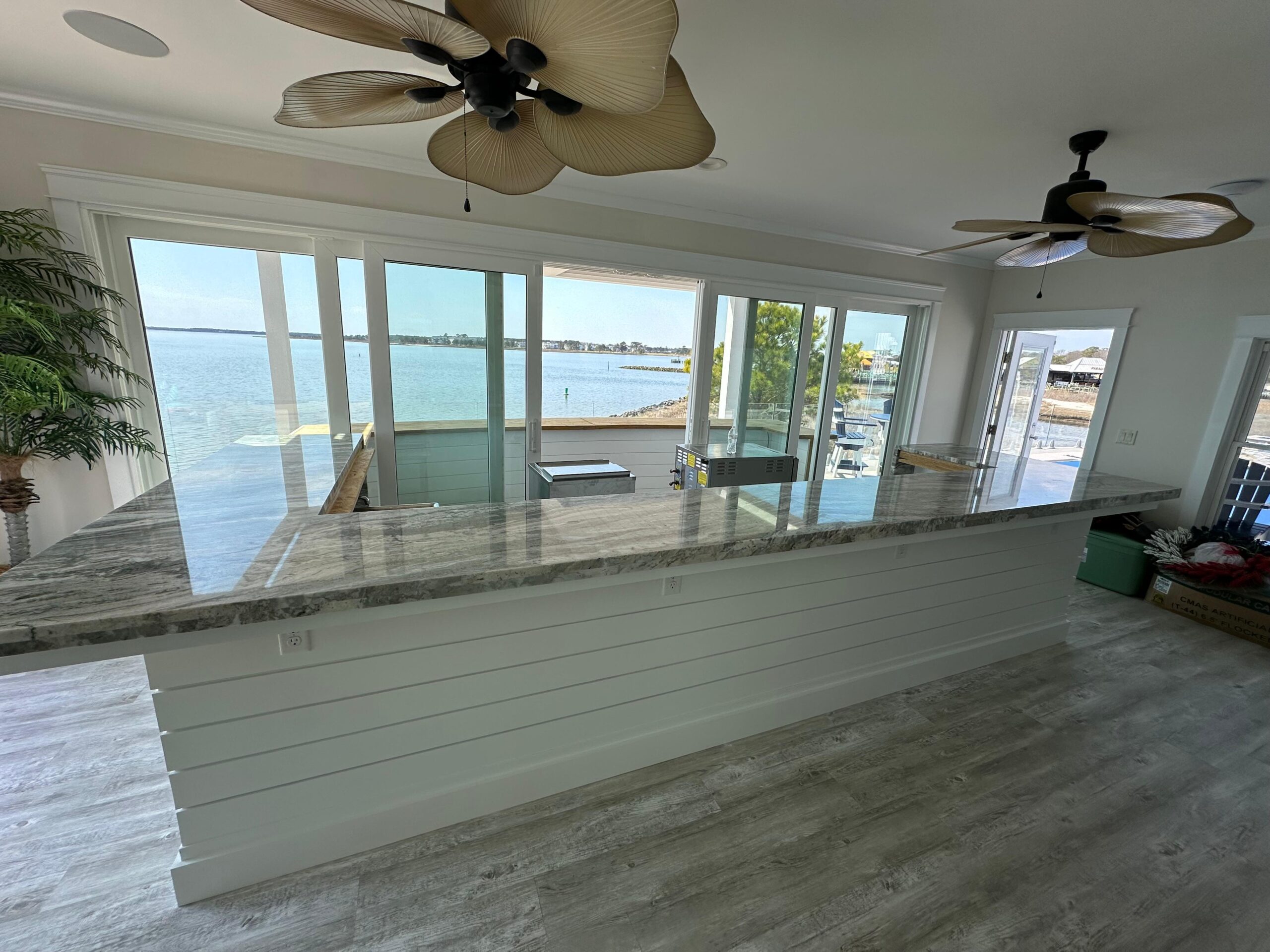Making the Perfect Countertop Choice for Homes
When renovating your kitchen, choosing the right countertop material can transform your space from ordinary to extraordinary. At ALB Granite, we’ve helped countless homeowners navigate this important decision. The two most popular premium options we install are granite and quartz—each with distinct characteristics, benefits, and considerations.
This comprehensive guide will help you understand the key differences between granite and quartz countertops, allowing you to make an informed decision that best suits your lifestyle, aesthetic preferences, and budget.
What is Granite?
Granite is a natural stone formed over millions of years through the cooling and solidification of molten materials deep within the earth. Each slab is completely unique—a one-of-a-kind piece of natural art with distinctive patterns, colors, and mineral compositions that cannot be replicated.
Pros of Granite Countertops
1. Unique Natural Beauty
No two granite slabs are identical. The natural variation in color, pattern, and mineral composition means your countertop will be truly one-of-a-kind, adding character and natural elegance to your home.
2. Heat Resistance
Granite can withstand high temperatures, making it ideal for busy kitchens. You can place hot pots and pans directly on granite without worrying about damage or discoloration.
3. Durability
When properly sealed and maintained, granite countertops can last for decades. They resist scratches and chips, making them a worthwhile long-term investment for your home.
4. Added Home Value
Natural stone countertops like granite are considered premium materials that can increase your home’s resale value—an important consideration in competitive real estate market.
5. Outdoor Application
Granite is UV-resistant, making it suitable for outdoor kitchens and entertainment areas, which are becoming increasingly popular in suburbs.
Cons of Granite Countertops
1. Maintenance Requirements
Granite requires periodic sealing (typically once a year) to maintain its resistance to stains and bacteria. While not difficult, this is an ongoing maintenance requirement.
2. Porosity
As a natural stone, granite is slightly porous. Without proper sealing, it can absorb liquids and potentially harbor bacteria or develop stains—particularly from acidic substances like wine, citrus, or tomato sauce.
3. Limited Color Consistency
If you’re looking for perfectly matching countertops throughout multiple areas of your kitchen, granite’s natural variation can make this challenging.
4. Potential for Cracking
While durable, granite can crack if subjected to significant impact, particularly along the edges or at weak points in the stone’s natural structure.
What is Quartz?
Unlike granite, quartz countertops (sometimes called engineered stone) are manufactured products consisting of approximately 90-95% ground natural quartz combined with polymer resins and pigments. This engineered approach allows for consistent colors and patterns while maintaining the beautiful appearance of natural stone.
Pros of Quartz Countertops
1. Low Maintenance
Quartz requires virtually no maintenance—no sealing, special cleaning products, or regular treatments. This makes it perfect for busy households with active lifestyles.
2. Non-Porous Surface
The resin binding in quartz creates a non-porous surface that resists staining and doesn’t harbor bacteria, making it one of the most hygienic countertop options available.
3. Consistent Appearance
Quartz offers predictable, uniform patterns and colors. This consistency makes it easier to match countertops across different sections of your kitchen and ensures what you see in the showroom is what you’ll get in your home.
4. Exceptional Durability
Quartz is engineered to be extremely durable—resistant to scratches, chips, and cracks. Many manufacturers offer warranties ranging from 10-25 years, reflecting their confidence in the product’s longevity.
5. Wide Range of Design Options
From convincing marble and granite looks to bold solid colors and unique patterns not found in nature, quartz offers virtually unlimited design possibilities for homeowners.
Cons of Quartz Countertops
1. Heat Sensitivity
While durable in most aspects, quartz is not as heat-resistant as granite. Hot pots and pans can potentially damage or discolor the resin component, requiring the use of trivets or hot pads.
2. UV Sensitivity
Quartz countertops can fade when exposed to direct sunlight over time, making them less suitable for outdoor kitchens or areas with significant natural light exposure.
3. Visible Seams
Depending on the size and layout of your kitchen, quartz installations may have visible seams, though professional fabricators like ALB Granite can minimize their appearance.
4. Higher Cost
Quality quartz brands often come at a premium price point, sometimes exceeding the cost of mid-range granite options.
Side-by-Side Comparison: Granite vs. Quartz
Appearance
- Granite: Natural, unique patterns with depth and character; limited to colors found in nature
- Quartz: Consistent, engineered patterns; wider range of colors and designs
Durability
- Granite: Extremely hard but can chip or crack with heavy impact; resistant to scratches
- Quartz: Highly resistant to chips, cracks, and scratches; more forgiving under impact
Maintenance
- Granite: Requires periodic sealing; daily cleaning with appropriate stone cleaners
- Quartz: No sealing required; simple cleaning with soap and water
Heat Resistance
- Granite: Excellent heat resistance; can withstand hot pots and pans
- Quartz: Moderate heat resistance; requires trivets or hot pads
Stain Resistance
- Granite: Good when properly sealed, but can stain if seal deteriorates
- Quartz: Excellent; non-porous surface resists most stains
Environmental Impact
- Granite: Natural product requiring quarrying; minimal processing but transportation impact
- Quartz: Engineered product using natural materials with added resins; controlled manufacturing process
Making Your Decision: Factors to Consider
1. Lifestyle Considerations
If your kitchen sees heavy use with young children or avid cooks, your priorities might differ from someone who rarely cooks or has a more formal kitchen space.
- For busy families: Quartz offers easier maintenance and better stain resistance.
- For gourmet cooks: Granite’s heat resistance might be more valuable.
2. Aesthetic Preferences
Your countertop should complement your overall design vision:
- For traditional homes: Granite’s natural appearance often complements colonial, Victorian, or traditional styles.
- For modern or contemporary spaces: Quartz’s consistent patterning and wider color range might better suit sleek, minimalist designs.
3. Long-term Planning
Consider how long you plan to stay in your home:
- For forever homes: Choose what you truly love regardless of trends.
- For resale value: Both materials add value, but neutral options appeal to the broadest range of potential buyers in the market.
4. Budget Realities
While both materials are premium options:
- Entry-level granite can be more affordable than most quartz.
- High-end exotic granite can exceed the cost of luxury quartz.
At ALB Granite, we offer financing options to help homeowners achieve their dream kitchens within their budget constraints.
Installation Considerations
Regardless of which material you choose, professional installation is crucial. ALB Granite’s expert fabricators and installers ensure:
- Precise measurements and templates
- Proper support for your countertop’s weight
- Expertly finished edges and seams
- Proper sealing (for granite)
- Careful coordination with plumbing and appliance requirements
Caring for Your New Countertops
Granite Care Tips:
- Seal annually (we provide guidance on the best products)
- Clean daily with pH-neutral stone cleaner
- Wipe spills promptly, especially acidic substances
- Use cutting boards to protect both the stone and your knives
- Avoid abrasive cleaners that can damage the sealant
Quartz Care Tips:
- Clean with mild soap and water or dedicated quartz cleaners
- Use cutting boards to prevent potential scratches
- Protect from extreme heat with trivets or hot pads
- Avoid harsh chemicals like paint removers or oven cleaners
- Clean spills promptly, especially from potential staining agents
Real Homes: ALB Granite Customer Stories
“We chose granite for our 1920s Center City row home kitchen because we wanted something that would complement the home’s historic character. The Verde Butterfly granite ALB Granite installed has become the showpiece of our renovation.” – Michael T., Center City
“As busy parents with three kids under 10, we opted for quartz in our Chestnut Hill home. The easy maintenance has been a lifesaver with our hectic lifestyle, and it still looks brand new after two years of intense family use.” – Sarah L., Chestnut Hill
Visit Our Showroom
The best way to make your decision is to see and feel these materials in person. At ALB Granite’s showroom, you can:
- Browse our extensive selection of granite and quartz slabs
- Speak with our knowledgeable design consultants
- Bring samples of your cabinetry, flooring, or paint colors to visualize the complete look
- Learn about edge profiles, sink options, and other customization possibilities
Conclusion: There’s No Wrong Choice
Both granite and quartz offer exceptional beauty, durability, and value. Your final decision should reflect your personal preferences, practical needs, and the specific characteristics of your home.
ALB Granite has proudly served the Philadelphia region for years, bringing expertise and craftsmanship to every project. Whether you choose the natural uniqueness of granite or the engineered perfection of quartz, our team will ensure your new countertops are fabricated and installed to the highest standards.
Ready to transform your kitchen with beautiful new countertops? Contact ALB Granite today for a free consultation and quote. Let us help you make the perfect choice for your home.



